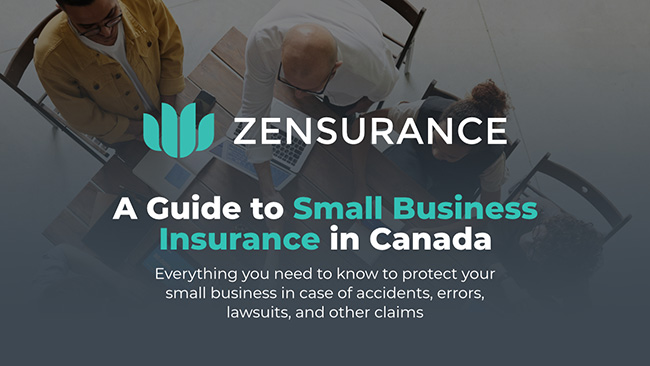Business owners, entrepreneurs, contractors and self-employed professionals buy business insurance to help them pay for damages and losses if things go wrong or if they’re sued.
Without insurance, one expensive incident, accident, or legal action against you can cost hundreds of thousands of dollars and threaten the financial viability and survival of any small business or self-employed individual.
After filing a claim for loss or damage, the insurance company that protects your business will assign an adjuster to do the following:
- Investigate the claim to ensure it’s valid (to prevent insurance fraud, a frequent problem that inflates the cost of insurance).
- Verify your coverage and coverage limits before determining whether or not your insurer is obligated to reimburse you for your losses.

Related Posts
Sign Up for ZenMail
"*" indicates required fields
Categories
After filing a claim for loss or damage, the insurance company that protects your business will assign an adjuster to do the following:
- Investigate the claim to ensure it’s valid (to prevent insurance fraud, a frequent problem that inflates the cost of insurance).
- Verify your coverage and coverage limits before determining whether or not your insurer is obligated to reimburse you for your losses.
Many things can go wrong, resulting in a small business filing a claim. However, sometimes, an insurance company may deny a claim. If that happens, Zensurance will connect with you to discuss the situation and the options available to you.
Here are 11 common reasons why an insurer could deny a business insurance claim:
1. You Don’t Have the Right Coverage
If your insurance policy doesn’t have the correct type of coverage for a specific type of claim, no insurance provider will pay for any damage or loss you suffer.
Example: If your small business suffers a cyber-attack, but you don’t have cyber liability insurance, the insurer is not obligated to cover your claim.
2. The Claim Is Fraudulent or Intentional
Claims that are fraudulent by intentionally causing damage or loss may be denied. Insurance is designed to cover unforeseen and accidental events, not fraudulent activities that did not occur or that were intentional. It is also against the law to commit insurance fraud. Doing so can lead to criminal charges, fines, or imprisonment.
Example: If a business owner is struggling financially and decides to set their commercial property on fire and make it appear as an accident in the hope they’ll receive an insurance payout, not only will the claim be denied, but they can be charged with arson and insurance fraud.
3. You Failed to Take Preventative Measures
Business owners are responsible for taking reasonable steps to protect their property from loss or damage aimed at minimizing or mitigating the extent of a loss or damage. If they fail to do so, an insurer may deny their claim.
Example: Your commercial property’s roof needs repair after a significant windstorm damages it, but the owner does nothing about it.
Over time, water leaking from the roof impacts the inside of the building, damaging the structure (and possibly your contents) and manifests in mould and rot. An insurer is unlikely to pay for the damages because the business owner neglected to address the maintenance issue.
4. Your Policy’s Exclusions Don’t Cover the Damage or Loss
All insurance policies contain exclusions. If the cause of the loss or damage is explicitly excluded in a business owner’s policy, their claim may be denied. That highlights the importance for all business owners to carefully review their policy exclusions to understand what is not covered.
Example: A commercial property policy is designed to cover damages because of extreme weather and natural disasters, but it may exclude risks such as earthquakes, overland floods, or storm surges.
If a business property is near a river prone to flooding, and following a period of heavy rain, the river floods and damages the business property, but the owner’s policy lists overland floods among its exclusions, they are unlikely to be compensated for their losses.
5, Your Policy Lapsed or Was Cancelled
If a business owner’s insurance policy lapses, expires or is cancelled by their insurer, they are effectively operating without insurance. If that happens, and you suffer any type of damage or loss, your insurer is not obligated to pay.
If your broker or insurer notifies you that your policy has lapsed, is cancelled, or may expire soon, do not hesitate to address the issue immediately and ensure your coverage is reinstated or renewed as quickly as possible.
Example: If your small business policy expires on January 31 and your retail store or office burns down two days later, the insurer is not obligated to cover your claim.
6. You Misrepresented Your Risks
If a business owner provides false information or misrepresents the risks associated with the business when they apply for coverage, and after filing a claim for damage or loss, your insurance provider becomes aware of it, the insurer may deny your claim.
Example: If you are a contractor, and you state on your insurance application you do deck installations and that’s it, you would not be covered if you have a claim for damages or losses after doing a roof repair.
7. Your Policy’s Coverage Limit Is Exceeded
All insurance policies have coverage limits (the maximum amount an insurer will pay for any individual claim).
If a small business owner insures their property and physical assets, but the coverage limit they select is not enough to cover their losses should all their property be destroyed, their insurer’s adjuster will assess what the correct coverage limit should have been, and then may proportionately reduce the amount of the claim payout.
Similarly, if a business owner files a third-party bodily injury liability claim that exceeds the policy’s limits, their insurance company will only pay up to the specified limit. Any excess amount above that will be the responsibility of the business owner to cover.
That’s why ensuring you accurately assess your liability risks and choose appropriate coverage limits is critical when assessing your potential for any type of claim.
8. You Made Unapproved Modifications to Your Property or Operations
If a small business makes significant changes to its operations or property without notifying their broker or insurer, a claim related to the modified area or change in business operations could be denied.
Example: A restaurant owner pays several thousand dollars to renovate their commercial kitchen, which involves changing the kitchen’s layout, installing new appliances, and upgrading the plumbing and electrical systems.
However, they neglect to notify their broker or insurer about the renovation project before it begins. In many commercial property insurance policies, there’s a requirement to inform the insurer of significant alterations or renovations.
Unfortunately, a fire destroys or significantly damages the kitchen while work is still underway. The insurer may deny the claim as the restaurant was being renovated and they were not informed of it.
9. You Failed to Pay Your Insurance Premium
If a business owner fails to pay their insurance premium on time as agreed, the policy may be cancelled in accordance with the conditions laid out in that insurance policy. Also, any subsequent claims could be denied if the policy is cancelled.
It’s crucial to maintain up-to-date premium payments to keep your coverage active.
10. You Failed to Disclose Accurate Information About Your Business
Providing inaccurate or incomplete information during the insurance application process can lead to a claim denial. It’s essential to be transparent and disclose all relevant details when obtaining coverage to avoid this scenario.
Example: If you list your business address as one location, but you primarily work from a secondary location, your coverage may not cover any claims (for contents or liability) that occur at the secondary location.
11. You Were Late Filing a Claim
Failing to report a claim promptly can result in an insurer denying a claim. Most insurance policies have a specified timeframe stating that a business owner must immediately notify their broker or insurer of an incident or accident.
What Options Does a Small Business Have If a Claim Is Denied?
If your insurance provider denies an insurance claim you file, there may be a few actions you can take to encourage them to reverse or revise their decision, such as:
- Get your broker’s help. Zensurance will represent its clients whenever they file a claim, and if their claim is denied, we will contact you to discuss the options available to you.
- Review your insurance policy. Most insurance policies contain guidance as to how you can file a complaint against the insurer or dispute a claim decision it makes.
- Contact the General Insurance OmbudService (GIO). GIO is an independent dispute resolution service that provides free help for Canadian business owners to appeal a claim their insurer denied. Not all insurance providers are affiliated with GIO and they are not obligated to abide by any recommendations it makes.
- Contact your provincial insurance regulatory authority. Each province has a regulator that oversees the insurance companies operating in their jurisdictions. You can contact them and inquire about the dispute resolution options available to you, and you can file a complaint with them about the insurer if you wish.
- Consider legal action. After exhausting all other options, and if you believe your claim is valid, you may consider taking legal action against the insurer. If you do, contact an experienced lawyer in your province to discuss the feasibility and implications of pursuing legal action against an insurance company.
How to Get the Worry-Free Business Insurance Protection You Need
The best way to avoid having an insurance claim denied is to ensure you have the right amount of coverage to safeguard your finances and assets and that your policy addresses your risks. A thorough risk assessment of your business and its operations is essential, and a Zensurance broker can help you.
Fill out our online application for a free business insurance quote. Afterwards, talk to one of our knowledgeable brokers about your business and any concerns you may have. Let us get you a low-cost policy that adequately covers your risks so you can concentrate on running your business worry-free.
– Reviewed by Michael McDermott, Director of Underwriting, Mohammad Samin, Senior Claims Advisor, and Reagan Elly, Claims Advisor, Zensurance.
Recent Posts
What Is a Deductible in Small Business Insurance? (Definition, Examples & How It Works)
A deductible is the amount your small business pays out of pocket when you file an insurance claim. Understanding how deductibles work can help you lower premiums, avoid surprises, and choose the right coverage.
Why E-Commerce Insurance Matters for Online Sellers in Canada
If you sell products online in Canada, e-commerce insurance – also known as online business insurance – is essential to protect your finances, inventory, and reputation. Here’s what online sellers, dropshippers, and small e-commerce businesses in Canada need to know.
What Happens If Your Small Business Gets Sued in Canada?
Being sued as a small business owner can be financially and emotionally overwhelming. Legal defence costs can quickly climb into the tens of thousands of dollars. This article explains what happens when your business is sued, how business liability insurance can help cover legal fees, and how to reduce your risk of being sued in the first place.









